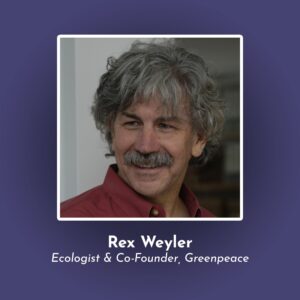
Ep 11 | Rex Weyler
Rex Weyler: “Crisis in the Ecology Movement”
On this episode, we meet with ecologist, writer, and Greenpeace cofounder, Rex Weyler.
Weyler explains how the ecology movement was hijacked by the environmental movement. How is climate change one of many issues that has a root cause of overshoot?
Weyler also explores the dangers of relying on hope as a strategy. Why must we be careful about virtual signalling in the environmental movement, and how can we “sharpen the sword” as individuals?
About Rex Weyler
Rex Weyler is a writer and ecologist. His books include Blood of the Land, a history of indigenous American nations, nominated for a Pulitzer Prize; Greenpeace: The Inside Story, a finalist for the BC Book Award and the Shaughnessy-Cohen Award for Political Writing; and The Jesus Sayings, a deconstruction of first century history, a finalist for the BC Book Award.
In the 1970s, Weyler was a cofounder of Greenpeace International and editor of the Greenpeace Chronicles. He served on campaigns to preserve rivers and forests, and to stop whaling, sealing, and toxic dumping.
He currently posts the “Deep Green” column at the Greenpeace International website. He lives on Cortes Island in British Columbia, with his wife, artist Lisa Gibbons.
In French, we have a motto that says that a simple drawing is often better than a long explanation. Jean-Marc Jancovici Carbone 4 President
That’s very understandable because with left atmosphere thinking, one of the problems is that you see everything as a series of problems that must have solutions. Iain McGilchrist Neuroscientist and Philosopher
We can’t have hundreds and hundreds of real relationships that are healthy because that requires time and effort and full attention and awareness of being in real relationship and conversation with the other human. Nate Hagens Director of ISEOF
This is the crux of the whole problem. Individual parts of nature are more valuable than the biocomplexity of nature. Thomas Crowther Founder Restor
Show Notes & Links to Learn More
Download transcript00:40: Rex Weyler books, essays, photographs, Deep Green essays index, Greenpeace: The Inside Story, “What Can We Do?”, Greenpeace documentary
01:39 – Greenpeace
02:11 – Ecology
03:37 – Carrying Capacity
04:57 – Overshoot
06:16 – Homeostasis
06:44 – K-species
08:20 – Mass extinctions
08:48 – Oxygen mass extinction
09:17 – Cambrian explosion
09:32: Phyla collapse after cambrian explosion
11:30 – Shrew-like ancestors
11:55 – Current mass extinction
12:14 – 100x-1000x background extinction rate
12:40 – Importance of biodiversity
13:40 – Ecolate
14:42 – Greenpeace and the women’s movement
15:14 – Sierra Club
16:30 – Our system is based on growth
17:02 – Randy Hayes
18:38 – Quadrupled material consumption rate
18:55 – Increase in starvation
19:41 – Rachel Carson, Aldo Leopold
20:07 – Ecological roots in Taoism, Buddhism and Indigeous culture
20:15 – Ernst Haeckel
20:49 – Gregory Bateson
22:06 – Stephan Harding
22:50 – Gregory Bateson Mind and Nature
24:59 – Energy surplus
26:21 – In-group/out-group
27:2 – Exo-energy
30:54 – Upton Sinclair
34:46 – Bill Rees, Vaclav Smil
35:24 – Superorganism
35:35 – Market’s control of the system
38:55 – Social status of wanting
39:20 – Boundaries of wealth
41:39 – Dopamine
47:18 – Greenpeace whale campaign in 1975
49:30 – 1981 Oil tanker test in Puget Sound
53:41 – Bob Hunter – Mind bomb
54:09 – Storming of the mind
56:36 – Signal to noise barrier
58:44 – Extinction Rebellion
58:48 – Fridays for future
1:03:19 – Don’t Look Up
1:05:22 – Virtue Signaling
1:06:40 – Theodore Sturgeon
1:09:02 – We cannot just stop cold using fossil fuels and continue our economy as usual
1:10:47 – Renewable themselves are a fossil intensive idea
1:11:34 – We need to contract our economy
1:11:59 – GDP and materials are coupled
1:12:26 – Decoupling is a myth
1:13:18 – Women’s rights and working against overpopulation
1:15:20 – 88 Million new humans per year
1:17:42 – Advance policy
1:22:16 – Militarism is a trillion dollar industry
1:23:02 – Schismogenesis
1:24:40 – Rex’s written recommendation to students







